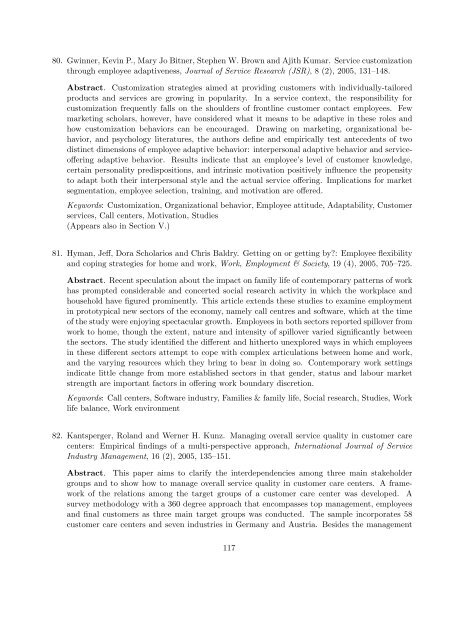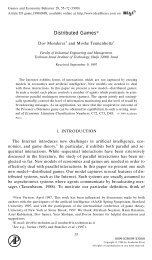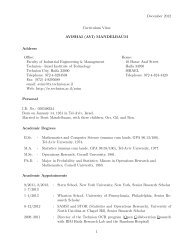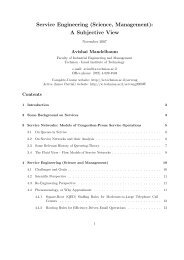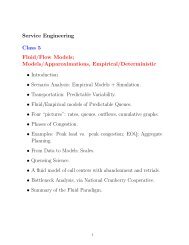CALL CENTERS (CENTRES) - Faculty of Industrial Engineering and ...
CALL CENTERS (CENTRES) - Faculty of Industrial Engineering and ...
CALL CENTERS (CENTRES) - Faculty of Industrial Engineering and ...
You also want an ePaper? Increase the reach of your titles
YUMPU automatically turns print PDFs into web optimized ePapers that Google loves.
80. Gwinner, Kevin P., Mary Jo Bitner, Stephen W. Brown <strong>and</strong> Ajith Kumar. Service customization<br />
through employee adaptiveness, Journal <strong>of</strong> Service Research (JSR), 8 (2), 2005, 131–148.<br />
Abstract. Customization strategies aimed at providing customers with individually-tailored<br />
products <strong>and</strong> services are growing in popularity. In a service context, the responsibility for<br />
customization frequently falls on the shoulders <strong>of</strong> frontline customer contact employees. Few<br />
marketing scholars, however, have considered what it means to be adaptive in these roles <strong>and</strong><br />
how customization behaviors can be encouraged. Drawing on marketing, organizational behavior,<br />
<strong>and</strong> psychology literatures, the authors define <strong>and</strong> empirically test antecedents <strong>of</strong> two<br />
distinct dimensions <strong>of</strong> employee adaptive behavior: interpersonal adaptive behavior <strong>and</strong> service<strong>of</strong>fering<br />
adaptive behavior. Results indicate that an employee’s level <strong>of</strong> customer knowledge,<br />
certain personality predispositions, <strong>and</strong> intrinsic motivation positively influence the propensity<br />
to adapt both their interpersonal style <strong>and</strong> the actual service <strong>of</strong>fering. Implications for market<br />
segmentation, employee selection, training, <strong>and</strong> motivation are <strong>of</strong>fered.<br />
Keywords: Customization, Organizational behavior, Employee attitude, Adaptability, Customer<br />
services, Call centers, Motivation, Studies<br />
(Appears also in Section V.)<br />
81. Hyman, Jeff, Dora Scholarios <strong>and</strong> Chris Baldry. Getting on or getting by?: Employee flexibility<br />
<strong>and</strong> coping strategies for home <strong>and</strong> work, Work, Employment & Society, 19 (4), 2005, 705–725.<br />
Abstract. Recent speculation about the impact on family life <strong>of</strong> contemporary patterns <strong>of</strong> work<br />
has prompted considerable <strong>and</strong> concerted social research activity in which the workplace <strong>and</strong><br />
household have figured prominently. This article extends these studies to examine employment<br />
in prototypical new sectors <strong>of</strong> the economy, namely call centres <strong>and</strong> s<strong>of</strong>tware, which at the time<br />
<strong>of</strong> the study were enjoying spectacular growth. Employees in both sectors reported spillover from<br />
work to home, though the extent, nature <strong>and</strong> intensity <strong>of</strong> spillover varied significantly between<br />
the sectors. The study identified the different <strong>and</strong> hitherto unexplored ways in which employees<br />
in these different sectors attempt to cope with complex articulations between home <strong>and</strong> work,<br />
<strong>and</strong> the varying resources which they bring to bear in doing so. Contemporary work settings<br />
indicate little change from more established sectors in that gender, status <strong>and</strong> labour market<br />
strength are important factors in <strong>of</strong>fering work boundary discretion.<br />
Keywords: Call centers, S<strong>of</strong>tware industry, Families & family life, Social research, Studies, Work<br />
life balance, Work environment<br />
82. Kantsperger, Rol<strong>and</strong> <strong>and</strong> Werner H. Kunz. Managing overall service quality in customer care<br />
centers: Empirical findings <strong>of</strong> a multi-perspective approach, International Journal <strong>of</strong> Service<br />
Industry Management, 16 (2), 2005, 135–151.<br />
Abstract. This paper aims to clarify the interdependencies among three main stakeholder<br />
groups <strong>and</strong> to show how to manage overall service quality in customer care centers. A framework<br />
<strong>of</strong> the relations among the target groups <strong>of</strong> a customer care center was developed. A<br />
survey methodology with a 360 degree approach that encompasses top management, employees<br />
<strong>and</strong> final customers as three main target groups was conducted. The sample incorporates 58<br />
customer care centers <strong>and</strong> seven industries in Germany <strong>and</strong> Austria. Besides the management<br />
117


